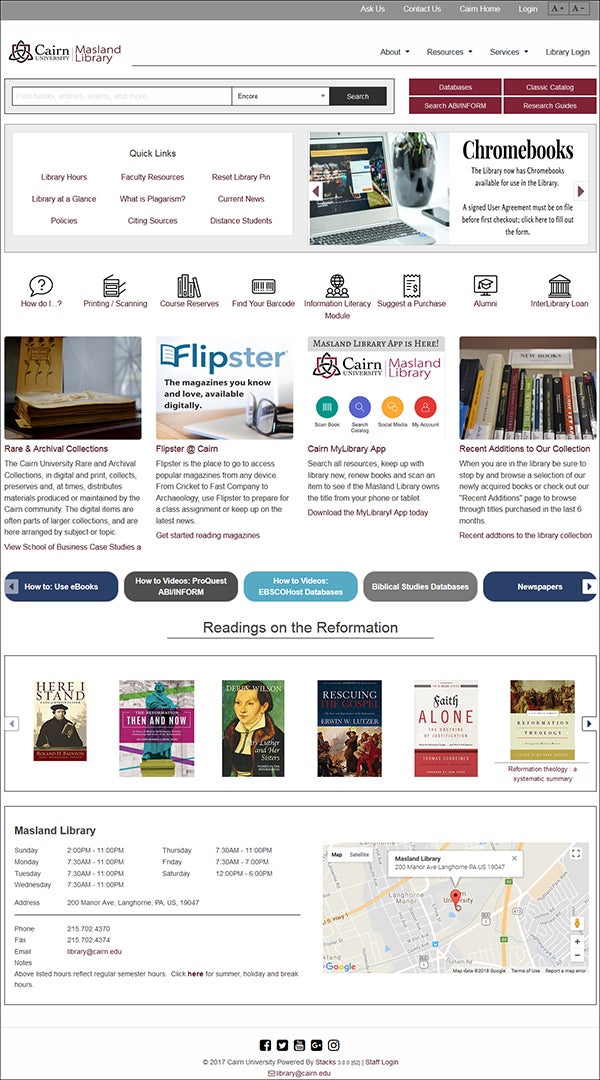
Overview
Located 25 miles northeast of Philadelphia in Langhorne, Pennsylvania, Cairn University offers more than 70 undergraduate and graduate degree programs in business, divinity, education, liberal arts, music, social work, and sciences. To support the research needs of its 1,200 students and faculty, Masland Library holds a collection of more than 129,000 print volumes and 750,000 electronic resources including e-books, e-journals and databases. The library subscribes to a variety of e-resources through EBSCO including Academic Search™ Ultimate, Business Source® Ultimate, PsycINFO®, several databases from the American Theological Library Association (ATLA), EBSCO eBooks™ and Flipster® digital magazines. In addition, the library implemented EBSCO Discovery Service™, a powerful research platform that searches across all the library’s holdings at once. The library recently launched a new-and-improved website powered by Stacks, a fully hosted web platform available only through EBSCO.
We had a lot of flexibility to make the website our own. Stacks really took a lot of work off my plate and stress out of my life. It’s a great product.
We had a lot of flexibility to make the website our own. Stacks really took a lot of work off my plate and stress out of my life. It’s a great product.
Challenges
When the Masland Library decided to refresh its website, library leaders knew they wanted a responsive site that would be more user-friendly and easier to maintain.
According to Assistant Director Stephanie Kaceli, librarians wanted the ability to make changes to website content without having to go through another university department. This meant moving the site off the University server and into the cloud.
“We had updated the web page as best as we could several years ago, but it was still looking really clunky and not [fully] web responsive,” Kaceli said. “We wanted a look that was clean and modern and sharp.”
Kaceli said she considered Springshare’s LibGuides CMS product, but she wasn’t well-versed in Bootstrap, the open-source framework for designing websites that powers the LibGuides CMS. “Some people have built great home pages with the LibGuides CMS. But I would need to close my office door for a month to figure it out and then have time to do the coding and make it work,” she explained. “We’re a tiny staff; we just don’t have that luxury.”
The ideal solution came in the form of Stacks, a turnkey, responsive web platform with plug and play integrations.
“When I saw the demo, I was speechless,” Kaceli said. Stacks, which seamlessly integrates both EBSCO Discovery Service and the library’s Encore ILS from Innovative Interfaces, “was much more than I ever thought it was going to be.”
The library purchased Stacks during the spring semester and officially launched their new website July 1.
Solutions
The Stacks website was easy to customize to meet the needs of Masland Library users, Kaceli said. From the library home page, users can type keywords in the search box at the top of the screen. They can then select “eResources Only” (EDS), “Encore” (both catalog and EDS), “Website” or “Bento” from the drop-down menu. Bento searches EDS, the library catalog and website content simultaneously, delivering all relevant results grouped by customized categories — such as e-books, articles, streaming resources, library catalog and news.
“The students really like the Bento search,” Kaceli said. “They like having everything in one spot.”
The home page also includes custom web buttons that link to the library’s classic catalog, ABI/INFORM database, LibGuides and Research Guides. Above the fold are Quick Links to frequently requested information and sliders that promote key library resources, programs or events.
“Very few people scroll down, so we wanted people to be able to access that information right away,” Kaceli explained.
Custom icons in the middle of the page connect students with additional library resources and services such as course reserves, inter-library loan and an information literacy module. Users can also suggest a title to purchase. Spotlight boxes promote the library’s Flipster digital magazines and rare archives while a carousel of cover images promotes the library’s print and e-book collections. Users will also find a carousel of web buttons linking them directly to how-to tutorials, newspapers and subject-specific databases. Finally, library hours, a map, and contact information appear in a box at the bottom of the page via seamless Google Places and Google Maps integrations.
“Stacks really listened to what an academic library wants and needs,” Kaceli said. “They really made it work for us.”

With Stacks, Kaceli can also assign user roles to other staff members. Librarians who have permission to edit static pages or update book carousel images will see only those modules in their Stacks dashboard.
“If something goes wrong, we can fix it quickly,” Kaceli said, adding that she can revert to previous versions of website content. This feature comes in handy each year when the library opens its application process for student workers. With one version that calls for applicants and another that states the application process is closed, Kaceli can easily switch between the two. “It’s so easy to update and change.”
Not only does Stacks give control of library website content back to librarians, but it also requires less time to implement than other platforms.
“I was able to keep working on other tasks while working on the website,” Kaceli said, adding that her duties include managing e-resources, acquisitions and the library budget. “If I had gone with the LibGuides CMS, my whole work life would have had to grind to a halt to see it happen.”
Benefits & Results
Since launching the library’s new Stacks website, the library has seen an increase in the number of searches and sessions. Kaceli said users are discovering more of the library’s resources, and the library is seeing a greater return on investment. For example, since the library posted a slider advertising Google Chromebooks for checkout, more students are signing up. She is also seeing database usage steadily increase.
Kaceli encourages other libraries looking to revamp their websites to consider Stacks.
“We had a lot of flexibility to make the website our own,” she said. “Stacks really took a lot of work off my plate and stress out of my life. It’s a great product.”